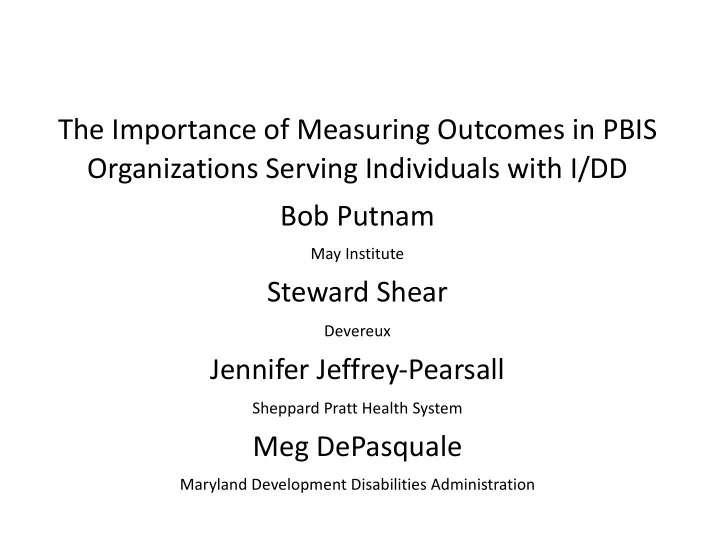

The Importance of Measuring Outcomes in PBIS Organizations Serving Individuals with I/DD Bob Putnam May Institute Steward Shear Devereux Jennifer Jeffrey-Pearsall Sheppard Pratt Health System Meg DePasquale Maryland Development Disabilities Administration
• To understand how effective and efficient data collection can lead to more achievable goals and improved outcomes. • To analyze incident data to assess program-wide progress, identify problem Goals areas and action plan for improvement. • To identify and use data collection tools to assess individual progress and quality of life indicators.
MEASURING OUTCOMES AT THE MAY INSTITUTE Bob Putnam Erin McDermott Kevin Donohue
May Institute • Large behavior analytical organization with a sixty- five year history serving individuals with autism/IDD – Serving 330 individuals in five private schools – Serving 542 adult individuals in day and residential services across 120 homes and 5 day habilitation programs – Providing center-based services to young children with ASD – Providing PBIS consultation to schools and agencies
May Institute • Serving primarily individuals with moderate to severe IDD with challenging behavior • Many who are limited communicators
PBIS Districts and Schools 2014-2019 250 200 2014-15 May Institute 186 177 PBIS District 2015-16 150 & School 233 2016-17 Support 173 2017-18 100 2018-19 2019-20 50 60 95 65 52 59 46 26 10 0 Districts/AgenciesSchools/Programs
Improving Behavior Support Practices • Built an el elec ectronic incident reporting system focusing on protective holds (PH) and physical escorts (PE) in 2014 called May Institute Data Analysis System (MIDAS) to answer the following queries – How many PHs and PEs per month? – Where do they occur? – When do they occur? – Which individual? – What time?
By Year
By month
By Location
Time of Day
By Individual
CASE SAMPLE
Tier 3 Outcomes • 21 individuals • 7 females, 14 males • Diagnoses of ASD and other developmental disabilities – Some have mental health and psychiatric diagnoses • All attend and/or live in May Institute day and residential programs
Percent of Individuals Responding to Tier 3 Intervention Pe 100% 10% 90% 29% 80% 40% 70% Non-Responder 60% Partial Responder 48% 50% Responder 40% 30% 50% 20% 24% 10% 0% Aug-13 Sep-15
Percent of Tier 3 Target Behaviors Improving Pe 80% 70% 65% 60% 50% 45% 40% 30% 20% 10% 0% 13-Aug 15-Sep
Total Protective Holds To 45 40 40 35 30 85% 85% 25 20 15 10 6 5 0 Year 1 Year 2
Quality of Life - Health • There are four major health issues that are common among individuals with intellectual and developmental disabilities (IDD) residing in congregate care settings or in community based residential settings. These health issues, commonly referred to as “The Fatal Four”, include aspiration, dehydration, constipation, and seizures.
Fatal Four – Aspiration • Tier 1 – Screening & Assessments – General training for direct care and select admin employees on: • Signs and symptoms of swallowing issues, aspiration and choking (which can lead to aspiration) • 911 protocol • First Aid training – Provision of standardized tools/blenders (Vitamix) with related-training at all programs which must process foods into specific textures. (Per organization practice, any blender present on-site must be a specific Vitamix model which is designed for commercial use and is known to be very durable.)
Fatal Four – Aspiration • Tier 2 – Modified Diets & Dining Protocols – Implementation of dining protocols at Day Habilitation Programs (now being extended/rolled out to residences and schools) • Tier 3 – Evaluation by Specialist for Specific Issues – Individual-specific dining protocols obtained and followed when necessary – Detailed training on individual-specific needs and diets for direct care employees – 911 Protocol
Aspiration Events
Quality of Life – Assessment • Essential for Living – A communication, behavior and functional living skills curriculum and assessment. • Screening for all individuals served to determine communication and behavioral functioning
National Core Indicators • National Core Indicators (NCI) is used across states to assess the quality and outcomes of Developmental Disability (DD) services provided to individuals with IDD and their families. • NCI offers valid, reliable, person-centered measures that states use to demonstrate how publicly funded supports are impacting people’s lives and to determine where they can improve the quality of those supports. • A total of 46 states and the District of Columbia participated in NCI in 2016-17.
Questions? Comments? THAN ANK YOU! Bob Putnam bputnam@mayinstitute Erin McDermott emcdermott@mayinstitute.org
Recommend
More recommend